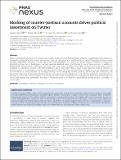| dc.contributor.author | Martel, Cameron | |
| dc.contributor.author | Mosleh, Mohsen | |
| dc.contributor.author | Yang, Qi | |
| dc.contributor.author | Zaman, Tauhid | |
| dc.contributor.author | Rand, David G | |
| dc.date.accessioned | 2024-12-03T17:58:20Z | |
| dc.date.available | 2024-12-03T17:58:20Z | |
| dc.date.issued | 2024-04-30 | |
| dc.identifier.uri | https://hdl.handle.net/1721.1/157743 | |
| dc.description.abstract | There is strong political assortment of Americans on social media networks. This is typically attributed to preferential tie formation (i.e. homophily) among those with shared partisanship. Here, we demonstrate an additional factor beyond homophily driving assorted networks: preferential prevention of social ties. In two field experiments on Twitter, we created human-looking bot accounts that identified as Democrats or Republicans, and then randomly assigned users to be followed by one of these accounts. In addition to preferentially following-back copartisans, we found that users were 12 times more likely to block counter-partisan accounts compared to copartisan accounts in the first experiment, and 4 times more likely to block counter-partisan accounts relative to a neutral account or a copartisan account in the second experiment. We then replicated these findings in a survey experiment and found evidence of a key motivation for blocking: wanting to avoid seeing any content posted by the blocked user. Additionally, we found that Democrats preferentially blocked counter-partisans more than Republicans, and that this asymmetry was likely due to blocking accounts who post low-quality or politically slanted content (rather than an asymmetry in identity-based blocking). Our results demonstrate that preferential blocking of counter-partisans is an important phenomenon driving political assortment on social media. | en_US |
| dc.language.iso | en | |
| dc.publisher | Oxford University Press | en_US |
| dc.relation.isversionof | 10.1093/pnasnexus/pgae161 | en_US |
| dc.rights | Creative Commons Attribution | en_US |
| dc.rights.uri | https://creativecommons.org/licenses/by/4.0/ | en_US |
| dc.source | Oxford University Press | en_US |
| dc.title | Blocking of counter-partisan accounts drives political assortment on Twitter | en_US |
| dc.type | Article | en_US |
| dc.identifier.citation | Cameron Martel, Mohsen Mosleh, Qi Yang, Tauhid Zaman, David G Rand, Blocking of counter-partisan accounts drives political assortment on Twitter, PNAS Nexus, Volume 3, Issue 5, May 2024, pgae161. | en_US |
| dc.contributor.department | Sloan School of Management | en_US |
| dc.contributor.department | Massachusetts Institute of Technology. Institute for Data, Systems, and Society | en_US |
| dc.contributor.department | Massachusetts Institute of Technology. Department of Brain and Cognitive Sciences | en_US |
| dc.relation.journal | PNAS Nexus | en_US |
| dc.eprint.version | Final published version | en_US |
| dc.type.uri | http://purl.org/eprint/type/JournalArticle | en_US |
| eprint.status | http://purl.org/eprint/status/PeerReviewed | en_US |
| dc.date.updated | 2024-12-03T17:51:42Z | |
| dspace.orderedauthors | Martel, C; Mosleh, M; Yang, Q; Zaman, T; Rand, DG | en_US |
| dspace.date.submission | 2024-12-03T17:51:44Z | |
| mit.journal.volume | 3 | en_US |
| mit.journal.issue | 5 | en_US |
| mit.license | PUBLISHER_CC | |
| mit.metadata.status | Authority Work and Publication Information Needed | en_US |
